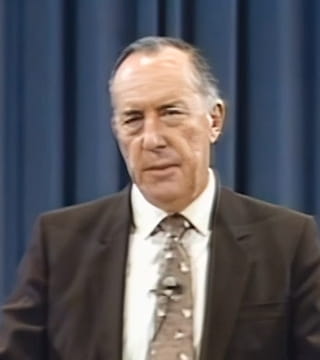Derek Prince - The Most Important Thing For Christians (05/14/2024)
This is an excerpt from: The Cross At The Center - Part 1
The theme for this evening is 'The Cross at the Center.' I'll be presenting this theme in two sessions. The theme originates in a conversation that I had with a Christian friend about two or three years ago. It wasn't a planned conversation, we weren't trying to be spiritual. I don't know exactly what we were talking about except some of the problems that had arisen in the church, the church at large. My friend said the church has so many items in its shop window today that people have lost sight of the cross.
Let me say that again. The church has so many items in its shop window today that people have lost sight of the cross. And as I meditated on that it just gripped me. I thought about so much that's being presented today to the church like teaching on healing, deliverance, prosperity, how to be a father, how to be a husband, how to do all sorts of things. I'm not in any sense criticizing such teaching because, as a matter of fact, I've taught myself on nearly all those themes. But you see, none of it works without the cross. The cross is the only source of grace and power to make all the other teaching work. If we don't keep the cross in the center, then we have a lot of fine principles and ethics and rules which we can't live up to. The usual result in the church has been when we find we can't live up to them then we gradually bring them down to our own standards. But they're not the standards of the New Testament.
In order to introduce this subject I would like to read some words of the apostle Paul in 1 Corinthians 2:1-5. I particularly enjoy the first two chapters of 1 Corinthians because in them essentially Paul is dealing with the difference between the wisdom of this world and the message of the cross. When he speaks about wisdom he had primarily in mind the philosophy of his day which was Greek philosophy. Before I became a committed Christian for seven years I was involved in the study of Greek philosophy at Cambridge University.
So, I feel I am particularly in a position to understand how true and appropriate Paul's words are about Greek philosophy. And then, philosophy and human wisdom in general. But I have to testify that it's very clear from Paul's writings that he had a very thorough understanding of Greek philosophy. He was, in fact, a highly educated man because he was also extremely well educated in the teachings of Judaism in his day. And yet here in these verses that I'm going to read he makes a most astonishing statement. He says, 'I determined to know nothing.' That's an unusual statement for any kind of person. But I'd have to say for Jewish people it's astonishing. Because if there's one thing that the Jews have prized historically through the centuries, it's knowledge. And to find a highly educated Jew saying I'm determined to know nothing, you have to ask yourself whatever could have made such a man make such a decision.
Let me read the words now. 1 Corinthians 2:1-5. And I, brethren, when I came to you [it's the church at Corinth], did not come with excellence of speech or of wisdom, dictating to you the testimony of God. For I determined not to know anything among you, except Jesus Christ, and him crucified. I was with you in weakness, and in fear and in much trembling. And my speech and my preaching were not with persuasive words of human wisdom, but in demonstration of the Spirit and of power, that your faith should not be in the wisdom of men, but in the power of God. We need to give this a historical setting. If we were to turn to the book of Acts we'd find that Paul's ministry in Corinth is described in Acts 18. But in the previous chapter, chapter 17, we have the record of Paul's ministry in Athens.
Now, Athens was the university city of the world in that time. It was the center of philosophy and human wisdom, the source of what we have come to call humanism. Paul, rather surprisingly I think, adjusted himself to his audience. He spoke to the upper level of the intellectual and social life of Athens and he talked in terms of philosophy. He even quoted a Greek poet. At the end the results were pretty meager. It says a few people believed. I don't know whether Paul was right, or wrong about his message but then he went on from Athens to Corinth which was a large port city, and a typical port city full of all sorts of vice, prostitution, homosexuality, immorality and extortion of every kind. In the meanwhile, somewhere between Athens and Corinth he made this decision. 'When I get to Corinth, I'm going to forget everything I knew except Jesus Christ, and Him crucified.'
The results in Corinth were tremendous, the whole city was stirred. The whole city was impacted by the news of the gospel and historians estimate that quite early on there were probably 25,000 believers in the city of Corinth. Totally different from the response, and the result in Athens. What made the difference? The message. Jesus Christ crucified.

